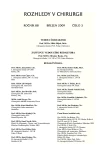-
Medical journals
- Career
The Effect of Preoperative Administration of Heparin on the Heparin Resistance Development
Authors: V. Brzek 1; V. Lonský 2; S. Jiška 3; J. Kubíček 1; D. Nováková 1; P. Valentová 1; J. Bímová 1; M. Volt 1
Authors‘ workplace: Kardiochirurgická klinika FN a LF UK Hradec Králové, přednosta: doc. MUDr. Jan Harrer, CSc. 1; Kardiochirurgická klinika FN UP Olomouc, přednosta: doc. MUDr. Vladimír Lonský, Ph. D. 2; Chirurgická klinika FN a LF UK Hradec Králové, přednosta: doc. MUDr. Alexander Ferko, CSc. 3
Published in: Rozhl. Chir., 2009, roč. 88, č. 3, s. 103-105.
Category: Monothematic special - Original
Overview
Background:
Heparin resistance is relatively frequent problem in cardio surgery. We were try to determine real occurrence heparin resistance before operation.Aim of the study:
Purpose of the project – to find the real frequency of heparin resistance in patients who will undergo a cardio surgical operation. To find out the dependence between the pre-operational application of heparin and the development of heparin resistance.Methods:
We recorded pre-operative administration heparin in patients. If the dose of heparin was 5 mg/kg and more then we insert patients to the group heparin resistant.Results:
In our collection was heparin resistance in 203 patients from 624, it was 32,5%. Test agreement relative frequency with 22% was throw out – p < 0.001 – heparin resistance in our group statistically different from 22% – heparin resistance was higher than hypothesis. Heparin before operation was administrate 181 patients, which make to 29%. For administration of heparin was hypothesis of independence thrown (p < 0.001).Conclusion:
Results of our works confirmed statistically significant occurrence of heparin resistance in patients that was administration heparin pre-operative. Heparin resistance occurred against presumption 22% in 32.5% in our group. It is statistic significant difference.Key words:
heparin resistance – activated clotting time – heparin – extracorporela circulation
Sources
1. Lonský, V. Mimotělní oběh v klinické praxi. Praha, Grada Publishing, a.s., 2004.
2. Cloyd, G. D’Ambra, M., Akins, C. Diminished anticoagulant response to heparin in patients undergoing coronary artery bypass grafting. I Thorac. Cardiovasc. Surg., 1994, 57, 1211–1216.
3. Staples, M., Dunton, R., Karlson, K., et al. Heparin resistance after preoperative heparin therapy. on intraaortic balloon pumping. Ann. Thorac. Surg., 1994, 57, 1211–1216.
4. Chlumský, J., a kol. Antikoagulační léčba. Praha, Grada Publishing, a.s., 2005.
5. Kubisz, P., a kol. Hematológia a transfuziológia, Praha, Grada Publishing, a.s., 2006.
6. Ganter, M. T., Monn, A., Tavakoli, R., et al. Monitoring activated clotting time for combined heparin and aprotinin application in vivo evaluation of a new aprotinin-sensitive test using Sonoclot. European Journal of Cardio-Thoracic Surgery, 2006, vol. 30, 278–284.
7. Isgró, G., Cazzaniga, A., Soro, G., et al. Predictors for heparin resistance in patients undergoing coronary artery bypass grafting. Perfusion, 1999, Vol. 14, No. 6, 437–442.
Labels
Surgery Orthopaedics Trauma surgery
Article was published inPerspectives in Surgery

2009 Issue 3-
All articles in this issue
- Giant Solitary Fibrous Tumor of the Pleura – Case Report
- The Effect of Preoperative Administration of Heparin on the Heparin Resistance Development
- A Six-Year Experience with Endovenous Laser in the Treatment of Lower Extremity Varices
- Hepatolithiasis – A Rare Disorder in Our Population
- Bouveret‘s Syndrome – A Rare Case of Proximal Ileus of Biliary Etiology
- The Upper Mesenteric Vein Thrombosis Following Upper GIT Robotic Surgery – A Case Review
- Limitations of Liver Resections
- Position Variability of the Vermiform Appendix and Effect on Diagnosis of Appendicitis in Children
- Diverticulitis Appendicis Vermiformis – A Case Review and Literature Overview
- Laparoscopic Pyeloplasty in Adults – Mid-Term Results in 32 Laparoscopic Pyeloplasties during 2003–2008
- Non-pigmented Subungual Malignancies – Crux Chirurgiae Minoris
- Surgeon Josef Hohlbaum – Life Story
- Perspectives in Surgery
- Journal archive
- Current issue
- Online only
- About the journal
Most read in this issue- Position Variability of the Vermiform Appendix and Effect on Diagnosis of Appendicitis in Children
- Limitations of Liver Resections
- Bouveret‘s Syndrome – A Rare Case of Proximal Ileus of Biliary Etiology
- Giant Solitary Fibrous Tumor of the Pleura – Case Report
Login#ADS_BOTTOM_SCRIPTS#Forgotten passwordEnter the email address that you registered with. We will send you instructions on how to set a new password.
- Career

